| Listing 1 - 10 of 15 | << page >> |
Sort by
|
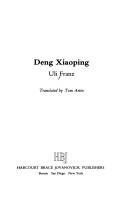
ISBN: 0151251770 Year: 1988 Publisher: Boston, Mass. Harcourt Brace Jovanovich
Abstract | Keywords | Export | Availability | Bookmark
 Loading...
Loading...Choose an application
- Reference Manager
- EndNote
- RefWorks (Direct export to RefWorks)
Heads of state --- #SML: Joseph Spae --- S05/0232 --- China: Biographies and memoirs--Deng Xiaoping --- Deng, Xiaoping, --- Teng, Hsiao-pʻing, --- Teng, Shiao-ping, --- Tŭng, So-pʻyŏng, --- Tō, Shōhei, --- Dén, Si︠a︡o-pin, --- Deng, Xiao Ping, --- Dengxiaoping, --- Teng, Hsziao-ping, --- Дэн, Сяопин, --- Dėn, Si︠a︡opin, --- Đặng, Tiểu Bình, --- Tiṅ, Źaʼo-phiṅ, --- Tiṅ-źaʼo-phiṅ, --- 鄧小平, --- 邓小平, --- [トウ] 小平, --- Deng, Bin, --- Teng, Pin, --- 邓斌, --- Tiṅ-śi, --- Deng Xiaoping
Book
ISBN: 0674062833 9780674062832 9780674055445 0674055446 9780674055 9789780674052 Year: 2011 Publisher: Cambridge, MA
Abstract | Keywords | Export | Availability | Bookmark
 Loading...
Loading...Choose an application
- Reference Manager
- EndNote
- RefWorks (Direct export to RefWorks)
Perhaps no one in the twentieth century had a greater long-term impact on world history than Deng Xiaoping. And no scholar of contemporary East Asian history and culture is better qualified than Ezra Vogel to disentangle the many contradictions embodied in the life and legacy of China's boldest strategist. Once described by Mao Zedong as a "needle inside a ball of cotton," Deng was the pragmatic yet disciplined driving force behind China's radical transformation in the late twentieth century. He confronted the damage wrought by the Cultural Revolution, dissolved Mao's cult of personality, and loosened the economic and social policies that had stunted China's growth. Obsessed with modernization and technology, Deng opened trade relations with the West, which lifted hundreds of millions of his countrymen out of poverty. Yet at the same time he answered to his authoritarian roots, most notably when he ordered the crackdown in June 1989 at Tiananmen Square. Deng's youthful commitment to the Communist Party was cemented in Paris in the early 1920's, among a group of Chinese student-workers that also included Zhou Enlai. Deng returned home in 1927 to join the Chinese Revolution on the ground floor. In the fifty years of his tumultuous rise to power, he endured accusations, purges, and even exile before becoming China's preeminent leader from 1978 to 1989 and again in 1992. When he reached the top, Deng saw an opportunity to creatively destroy much of the economic system he had helped build for five decades as a loyal follower of Mao-and he did not hesitate.
Heads of state --- Deng, Xiaoping, --- Teng, Hsiao-pʻing, --- Teng, Shiao-ping, --- Tŭng, So-pʻyŏng, --- Tō, Shōhei, --- Dén, Si︠a︡o-pin, --- Deng, Xiao Ping, --- Dengxiaoping, --- Teng, Hsziao-ping, --- Дэн, Сяопин, --- Dėn, Si︠a︡opin, --- Đặng, Tiểu Bình, --- Tiṅ, Źaʼo-phiṅ, --- Tiṅ-źaʼo-phiṅ, --- 鄧小平, --- 邓小平, --- [トウ] 小平, --- Deng, Bin, --- Teng, Pin, --- 邓斌, --- Tiṅ-śi, --- China --- Politics and government
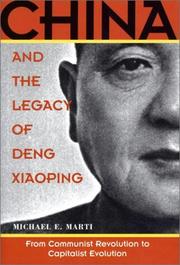
ISBN: 1612342132 9781612342139 1574884166 9781574884166 1574885405 Year: 2002 Publisher: Washington, D.C. Potomac Books, Inc.
Abstract | Keywords | Export | Availability | Bookmark
 Loading...
Loading...Choose an application
- Reference Manager
- EndNote
- RefWorks (Direct export to RefWorks)
China and the Legacy of Deng Xiaoping documents a turning point in the Chinese communist revolution that elevates Deng to a role equal to that of Mao. Dr. Marti explores post-Tiananmen domestic political wrangling and offers the first documentation of Deng's efforts to link all the major elements of society-the PLA, the Party, the revolutionary elders, and the regional governors-into a coalition whose survival depends on the success of his economic policies.Understanding this sense of commitment to China's long-term goals has significant implications for predicting the outcome of the current s
Deng, Xiaoping, --- Teng, Hsiao-pʻing, --- Teng, Shiao-ping, --- Tŭng, So-pʻyŏng, --- Tō, Shōhei, --- Dén, Si︠a︡o-pin, --- Deng, Xiao Ping, --- Dengxiaoping, --- Teng, Hsziao-ping, --- Дэн, Сяопин, --- Dėn, Si︠a︡opin, --- Đặng, Tiểu Bình, --- Tiṅ, Źaʼo-phiṅ, --- Tiṅ-źaʼo-phiṅ, --- 鄧小平, --- 邓小平, --- [トウ] 小平, --- Deng, Bin, --- Teng, Pin, --- 邓斌, --- Tiṅ-śi, --- China --- Economic policy
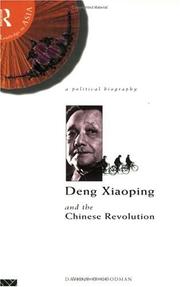
ISBN: 1134831226 1280331291 9786610331291 0203035216 9780203035214 9780415112529 0415112524 9780415112536 0415112532 6610331294 0415112524 0415112532 9781134831227 9781134831173 113483117X 9781134831210 1134831218 Year: 1994 Publisher: London New York Routledge
Abstract | Keywords | Export | Availability | Bookmark
 Loading...
Loading...Choose an application
- Reference Manager
- EndNote
- RefWorks (Direct export to RefWorks)
David Goodman reaches beyond China's spectacular economic success of recent years to understand the sources of Deng's political power. This is a balanced evaluation of the career of one of the century's great political survivors.
Heads of state --- Deng, Xiaoping, --- Teng, Hsiao-pʻing, --- Teng, Shiao-ping, --- Tŭng, So-pʻyŏng, --- Tō, Shōhei, --- Dén, Si︠a︡o-pin, --- Deng, Xiao Ping, --- Dengxiaoping, --- Teng, Hsziao-ping, --- Дэн, Сяопин, --- Dėn, Si︠a︡opin, --- Đặng, Tiểu Bình, --- Tiṅ, Źaʼo-phiṅ, --- Tiṅ-źaʼo-phiṅ, --- 鄧小平, --- 邓小平, --- [トウ] 小平, --- Deng, Bin, --- Teng, Pin, --- 邓斌, --- Tiṅ-śi,
Book
ISBN: 019939203X 1336029587 0199392056 0199392048 0190623675 9780199392049 9780199392032 9780199392032 Year: 2015 Publisher: New York, New York : Oxford University Press,
Abstract | Keywords | Export | Availability | Bookmark
 Loading...
Loading...Choose an application
- Reference Manager
- EndNote
- RefWorks (Direct export to RefWorks)
Deng Xiaoping joined the Chinese Communist movement as a youth and rose in its ranks to become an important lieutenant of Mao's from the 1930s onward. Two years after Mao's death in 1976, Deng became the de facto leader of the Chinese Communist Party and the prime architect of China's post-Mao reforms. Abandoning the Maoist socio-economic policies he had long fervently supported, he set in motion changes that would dramatically transform China's economy, society, and position in the world. Three decades later, we are living with the results. China has become the second largest economy and the
Heads of state --- Deng, Xiaoping, --- China --- Politics and government --- Teng, Hsiao-pʻing, --- Teng, Shiao-ping, --- Tŭng, So-pʻyŏng, --- Tō, Shōhei, --- Dén, Si︠a︡o-pin, --- Deng, Xiao Ping, --- Dengxiaoping, --- Teng, Hsziao-ping, --- Дэн, Сяопин, --- Dėn, Si︠a︡opin, --- Đặng, Tiểu Bình, --- Tiṅ, Źaʼo-phiṅ, --- Tiṅ-źaʼo-phiṅ, --- 鄧小平, --- 邓小平, --- [トウ] 小平, --- Deng, Bin, --- Teng, Pin, --- 邓斌, --- Tiṅ-śi,
Book
ISBN: 9780674055445 Year: 2011 Publisher: Cambridge Belknap press of Harvard university press
Abstract | Keywords | Export | Availability | Bookmark
 Loading...
Loading...Choose an application
- Reference Manager
- EndNote
- RefWorks (Direct export to RefWorks)
Heads of state --- Chefs d'Etat --- Biography --- Biographie --- Deng, Xiaoping, --- China --- Chine --- Politics and government --- Politique et gouvernement --- Heads of stateDeng, Xiaoping,ChinaPolitics and government --- S05/0232 --- China: Biographies and memoirs--Deng Xiaoping --- Teng, Hsiao-pʻing, --- Teng, Shiao-ping, --- Tŭng, So-pʻyŏng, --- Tō, Shōhei, --- Dén, Si︠a︡o-pin, --- Deng, Xiao Ping, --- Dengxiaoping, --- Teng, Hsziao-ping, --- Дэн, Сяопин, --- Dėn, Si︠a︡opin, --- Đặng, Tiểu Bình, --- Tiṅ, Źaʼo-phiṅ, --- Tiṅ-źaʼo-phiṅ, --- 鄧小平, --- 邓小平, --- [トウ] 小平, --- Deng, Bin, --- Teng, Pin, --- 邓斌, --- Tiṅ-śi,
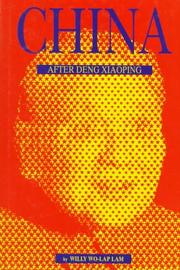
ISBN: 0471131148 Year: 1995 Publisher: New York John Wiley & Sons
Abstract | Keywords | Export | Availability | Bookmark
 Loading...
Loading...Choose an application
- Reference Manager
- EndNote
- RefWorks (Direct export to RefWorks)
812 Ideologie --- 821.5 Mensenrechten --- 830 Economie --- 836 (Multi-)nationale ondernemingen --- 838 Duurzame Ontwikkeling --- 841 Politiek Bestel --- 841.1 Democratisering --- 841.3 Politieke bewegingen --- 841.4 Politieke figuren --- 883.2 Oost-Azië --- Deng, Xiaoping, --- Teng, Hsiao-pʻing, --- Teng, Shiao-ping, --- Tŭng, So-pʻyŏng, --- Tō, Shōhei, --- Dén, Si︠a︡o-pin, --- Deng, Xiao Ping, --- Dengxiaoping, --- Teng, Hsziao-ping, --- Дэн, Сяопин, --- Dėn, Si︠a︡opin, --- Đặng, Tiểu Bình, --- Tiṅ, Źaʼo-phiṅ, --- Tiṅ-źaʼo-phiṅ, --- 鄧小平, --- 邓小平, --- [トウ] 小平, --- Deng, Bin, --- Teng, Pin, --- 邓斌, --- Tiṅ-śi, --- China --- Politics and government
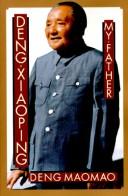
ISBN: 0465016251 Year: 1995 Publisher: New York (N.Y.): Basic Books
Abstract | Keywords | Export | Availability | Bookmark
 Loading...
Loading...Choose an application
- Reference Manager
- EndNote
- RefWorks (Direct export to RefWorks)
S05/0232 --- Heads of state --- -#SML: Chinese memorial library --- Heads of government --- Rulers --- State, Heads of --- Executive power --- Statesmen --- China: Biographies and memoirs--Deng Xiaoping --- Deng, Xiaoping --- Deng Xiaoping --- deng xiao ping --- #SML: Chinese memorial library --- Deng, Xiaoping, --- Teng, Hsiao-pʻing, --- Teng, Shiao-ping, --- Tŭng, So-pʻyŏng, --- Tō, Shōhei, --- Dén, Si︠a︡o-pin, --- Deng, Xiao Ping, --- Dengxiaoping, --- Teng, Hsziao-ping, --- Дэн, Сяопин, --- Dėn, Si︠a︡opin, --- Đặng, Tiểu Bình, --- Tiṅ, Źaʼo-phiṅ, --- Tiṅ-źaʼo-phiṅ, --- 鄧小平, --- 邓小平, --- [トウ] 小平, --- Deng, Bin, --- Teng, Pin, --- 邓斌, --- Tiṅ-śi,

ISBN: 0415112524 0415112532 Year: 1994 Publisher: London Routledge
Abstract | Keywords | Export | Availability | Bookmark
 Loading...
Loading...Choose an application
- Reference Manager
- EndNote
- RefWorks (Direct export to RefWorks)
Deng Xiaoping --- S05/0232 --- 951.09 --- Heads of state --- -951.09 Geschiedenis van China: republiek (1912- ) --- Geschiedenis van China: republiek (1912- ) --- Heads of government --- Rulers --- State, Heads of --- Executive power --- Statesmen --- China: Biographies and memoirs--Deng Xiaoping --- Deng, Xiaoping --- deng xiao ping --- 951.09 Geschiedenis van China: republiek (1912- ) --- Deng, Xiaoping, --- Teng, Hsiao-pʻing, --- Teng, Shiao-ping, --- Tŭng, So-pʻyŏng, --- Tō, Shōhei, --- Dén, Si︠a︡o-pin, --- Deng, Xiao Ping, --- Dengxiaoping, --- Teng, Hsziao-ping, --- Дэн, Сяопин, --- Dėn, Si︠a︡opin, --- Đặng, Tiểu Bình, --- Tiṅ, Źaʼo-phiṅ, --- Tiṅ-źaʼo-phiṅ, --- 鄧小平, --- 邓小平, --- [トウ] 小平, --- Deng, Bin, --- Teng, Pin, --- 邓斌, --- Tiṅ-śi, --- China --- Biography --- Teng, Hsiao-p°ing, - 1904 --- -Heads of state --- -Deng Xiaoping
Book
ISBN: 1469623390 9781469623399 9781469621258 1469621258 9781469621241 146962124X 9781469642345 9798890843630 Year: 2015 Publisher: Chapel Hill [North Carolina]
Abstract | Keywords | Export | Availability | Bookmark
 Loading...
Loading...Choose an application
- Reference Manager
- EndNote
- RefWorks (Direct export to RefWorks)
The surprise Chinese invasion of Vietnam in 1979 shocked the international community. The two communist nations had seemed firm political and cultural allies, but the twenty-nine-day border war imposed heavy casualties, ruined urban and agricultural infrastructure, leveled three Vietnamese cities, and catalyzed a decadelong conflict. In this groundbreaking book, Xiaoming Zhang traces the roots of the conflict to the historic relationship between the peoples of China and Vietnam, the ongoing Sino-Soviet dispute, and Chinese leader Deng Xiaoping's desire to modernize his country. Deng's perceptions of the Soviet Union, combined with his plans for economic and military reform, shaped China's strategic vision. Drawing on newly declassified Chinese documents and memoirs by senior military and civilian figures, Zhang takes readers into the heart of Beijing's decision-making process and illustrates the war's importance for understanding the modern Chinese military, as well as China's role in the Asian-Pacific world today.
Sino-Vietnamese Conflict, 1979. --- Chinese-Vietnamese Conflict, 1979 --- Vietnamese-Chinese Conflict, 1979 --- Deng, Xiaoping, --- Teng, Hsiao-pʻing, --- Teng, Shiao-ping, --- Tŭng, So-pʻyŏng, --- Tō, Shōhei, --- Dén, Si︠a︡o-pin, --- Deng, Xiao Ping, --- Dengxiaoping, --- Teng, Hsziao-ping, --- Дэн, Сяопин, --- Dėn, Si︠a︡opin, --- Đặng, Tiểu Bình, --- Tiṅ, Źaʼo-phiṅ, --- Tiṅ-źaʼo-phiṅ, --- 鄧小平, --- 邓小平, --- [トウ] 小平, --- Deng, Bin, --- Teng, Pin, --- 邓斌, --- Tiṅ-śi, --- Military leadership. --- Sino-Vietnamese Conflict, 1979 --- S04/0922 --- S04/0923 --- S09/0412 --- China: History--PRC: 1976 - 1989 --- China: History--PRC: since 1989 --- China: Foreign relations and world politics--China and South-East Asia (incl. Vietnamese war) --- Sino-Vietnamese Conflict (1979)
| Listing 1 - 10 of 15 | << page >> |
Sort by
|

 Search
Search Feedback
Feedback About UniCat
About UniCat  Help
Help News
News